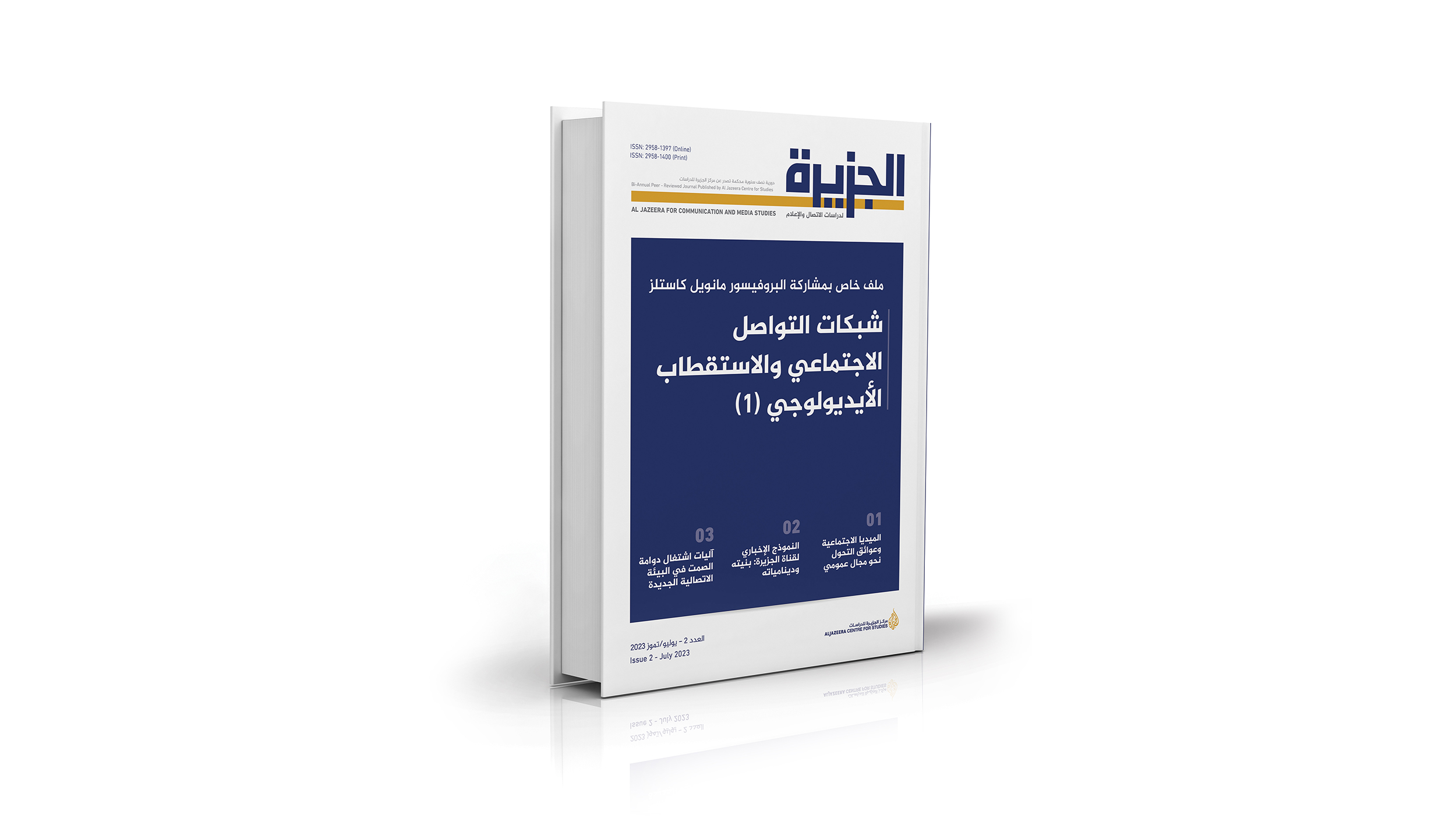
Al Jazeera Centre for Studies has released the second issue of Al Jazeera li Dirasat al-Itisal wa al-I’lam [Al Jazeera for Communications and Media Studies], which features a research dossier that examines the role of social media networks in ideological polarisation and its cultural, social and political implications. This research constitutes the proceedings of a conference held by the centre in partnership with the Department of Mass Communications at Qatar University on 1-2 March 2023, under the title "Social Media Networks and Ideological Polarization: Power Relations and Socio-Cultural Impact," with the participation of a distinguished group of academics, experts and specialised researchers.
The first part of the dossier includes two lectures, one presented by Professor Manuel Castells and the other by Dr. Nabil Dajani, along with six studies and research papers that discuss various issues. The journal will publish the second part of the conference proceedings in the third issue (January 2024). In the first lecture, “Social Media and Political Polarisation”, Castells reviews the relationship between social media networks and ideological polarisation. He identifies the forms of interaction between these variables and emphasises the importance of the social and communication factors in the process of polarisation. In the second lecture, “The Ethical and Legal Structure for a Just Social Media Public Sphere”, Dajani argues that addressing the growing problems of social media networks requires a “social process” approach rather than regulatory measures. This process involves developing targeted communication strategies that can bring about changes in both thinking and behaviour.
The research studies in the dossier begin with the problem addressed by Dr. Noureddine Miladi and Anwar Alorfe in their study, “The War on the Palestinian Narrative: Obstructing Palestinian Content on Social Media”. The study tackles what they refer to as the “digital aggression” targeting digital content produced by Palestinian entities or in support of Palestine. The research problem stems from the fact that this “digital aggression” violates digital rights and freedoms, thereby threatening freedom of expression globally. Similarly, the study conducted by AJCS researcher Mohamed Erraji reveals the manifestations of the hegemonic inclination of the Israeli narrative through preferential access given to Israeli discourse producers in the use of social media networks, contributing to the digital aggression against Palestinian content and the enclosure of Palestinian narratives.
In the context of investigating the role of social media networks in promoting populist discourse, a study by Dr. Mutasim Babiker Mustafa, focusing on the Sudanese case, reveals the impact of social media on the growth of populist discourse. The prominent elements of this discourse include the dissemination of hatred, the escalation of tribalism, and the incitement to violence and rebellion against national unity and territorial integrity.
Dr. Fatma Elzahraa Elsayed’s study, “The Aspects of Ideological Polarisation between Muslims and Hindus on TikTok (September 2021- December 2022)”, analyses the content map produced by the Muslim-Hindu conflict as one of the manifestations of the post-colonial era. Nacer-Eddine Layadi, on the other hand, poses questions in his study, “Social Media and Political Polarisation: Obstacles to the Shift to a Public Sphere in the Arab World”, to determine the relationship between social media networks and the public sphere, including: Can social media turn into a public sphere? To what extent does political and ideological polarisation hinder the transformation of the public space into a public sphere in the Arab region?
To address the challenges posed by the use of social media networks within the framework of ethical content communication, Hicham El Makki presents a new perspective on social media ethics in a study titled “Social Media Ethics: From Content Ethics to Ethical Design: Facebook as an Example”.
In the "Studies and Research" section, the issue includes research by Dr. Abdessalam Razak titled, “The News Model of Al Jazeera Channel: Structure and Dynamics”. The study approaches the characteristics and features of Al Jazeera’s model by focusing on its structure and dynamics as a distinct editorial choice for the channel. Additionally, a study conducted by researchers Jamel Zran and Abdullah Bakhash examines the potential effects of the new communications environment on the mechanisms of the spiral of silence, applied to three contentious issues related to the Yemeni crisis: the role of the Arab coalition in Yemen, the legitimacy of former President Abd Rabu Mansour Hadi, and the call for the secession of the southern provinces from the unified state of Yemen.
Furthermore, the section dedicated to the Modern Media Dictionary features the work of Dr. Imad Bachir, who prepared the scientific material that contributes to building the foundations of the dictionary. It represents a cognitive addition to the lexical industry that achieves an accumulation of media knowledge. The importance of this project increases as it serves as a scientific intermediary that documents the connection to its field of study, providing readers with a profound awareness of how the lexicon expresses the dynamics of media phenomena and issues it addresses by examining the origins of words as well as the formation of terms and concepts and their historical development.
In the "Book Review" section, Wael Abdelal reviews Digital Media Effects by American academic and researcher William James Potter. The book examines the importance of studying the impact of digital media on individuals and societies and seeks to determine whether its effects differ from those of traditional media that have been previously studied.
In the "Theses and Dissertations" section, Youcef Kherfi discusses how the Algerian elite, namely university professors, receive and react to the content of Al Jazeera channel. Another dissertation, prepared by Omama Mustafa Al Lawati, examines the mechanisms of Al Jazeera's media discourse during important events such as the Abu Ghraib prison scandal in 2004, the U.S. attack on Fallujah, the subsequent violations against Iraqi prisoners in 2013, and the third Battle of Fallujah in 2016.